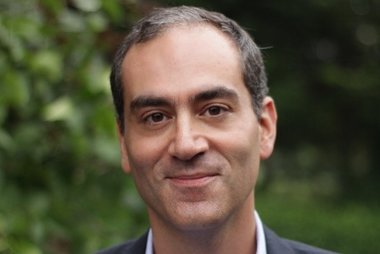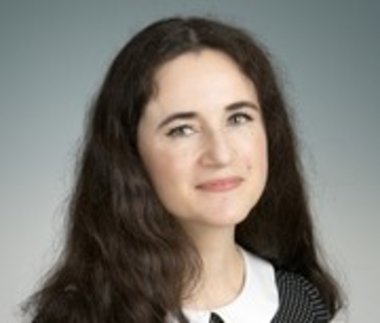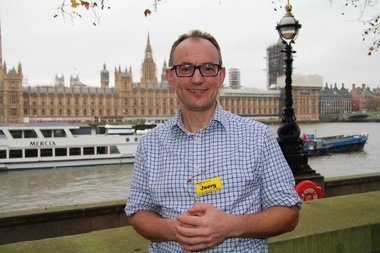Incredible progress in narcolepsy by KHP Sleep Services
Hear from experts in neurology, psychiatry and respiratory medicine leading innovative research into sleep disorders.
The Sleep Disorders Centre within King’s Health Partners is a nationally renowned centre of excellence for the treatment and research of sleep disorders.
Prof Guy Leschziner, Consultant Neurologist and the Clinical Lead for the Sleep Disorders Centre at Guy’s and St Thomas’ NHS Foundation Trust & Professor of Neurology and Sleep Medicine; Dr Ivana Rosenzweig, Consultant Neuropsychiatrist and an accredited sleep physician based at the Sleep Disorders Centre; and Prof Joerg Steier, Consultant Respiratory Physician & Professor of Respiratory and Sleep Medicine talk about the service, areas of research and how their work aims to improve outcomes for patients.
Please tell us about the Sleep Disorders Centre?
 Prof Leschziner [pictured] leads the Sleep Disorders Centre and his research interests have been in narcolepsy, sleepwalking, Kleine-Levin syndrome and restless legs syndrome. He now focuses primarily on public engagement and education of the wider clinical community about sleep medicine. Here he describes how the sleep service has evolved over the last ten years:
Prof Leschziner [pictured] leads the Sleep Disorders Centre and his research interests have been in narcolepsy, sleepwalking, Kleine-Levin syndrome and restless legs syndrome. He now focuses primarily on public engagement and education of the wider clinical community about sleep medicine. Here he describes how the sleep service has evolved over the last ten years:
"When I started as a consultant the Sleep Disorders Centre was primarily a respiratory led service largely focused on sleep apnoea but almost organically it has grown into a more general sleep service. My role was to provide neurological input but it became very apparent that although sleep apnoea still constitutes the majority of the patients that we see there are a very large number of individuals requiring more specialised neurological or psychiatric input. These range from individuals with parasomnias (sleepwalking or acting out their dreams), to individuals with narcolepsy or other related conditions such as restless legs syndrome and a wide range of other non-respiratory sleep disorders.
"The Sleep Disorders Centre has 10 inpatient beds where sleep studies are carried out with three of the beds equipped to undertake specialist epilepsy sleep studies. Over the past 10 years, the service has been driving a more multidisciplinary approach to sleep and the team now includes several specialist roles including neurology, neuropsychiatry, general psychiatry, respiratory, pharmacy, psychology and 40 sleep technologists. With these changes the service is now a highly specialised neurological, psychiatric and respiratory service."
Prof Leschziner also highlighted the important role that the centre’s clinical fellows play in providing training across the UK.
What do you think has had the most positive impact on patients this past year?
Prof Leschziner continued:
"There are a few things that we are doing for example we have been at the vanguard of developing and getting access to new drugs for our narcolepsy patients and are leaders in creating an evidence base for those new drugs to enable wider access for patients with narcolepsy nationally. The service sees patients from across the UK and a particular impact of the pandemic is that it has encouraged the service to increase the use of virtual follow up clinics. That model of care works extremely well for many patients with sleep disorders and has improved access to the service."
How is the team seeking to improve outcomes for people with sleep disorders?
Dr Ivana Rosenzweig [pictured] has interests in complex sleep and cognitive issues. She heads the Sleep and Brain Plasticity Centre (SleepCity) at the Centre for Neuroimaging Sciences (CNS), King’s College London, with the primary research mission to generate new understanding of mechanisms behind serious neurological and psychiatric disorders.
She describes below how the SleepCity lab collaborates with many national and international sleep experts around the world:
"The group benefits from its close connection with the Sleep Disorders Centre, as well as with the unparalleled expertise in the neurosciences and psychiatric research that Institute of Psychiatry, Psychology and Neuroscience (IoPPN) offers.
"My research group’s most recent achievements include demonstrating for the first time that the nocturnal arousals during the sleep, which arise due to the most prevalent sleep breathing disorder, obstructive sleep apnoea (OSA), may lead to inflammation of the brain in patients with a severe illness. This finding may also explain the increasingly recognised links of OSA with psychiatric disorders, as well as with dementia.
"The group collaborates extensively with colleagues in neurology, psychiatry and imaging across King’s Health Partners and has also been involved in:
- Establishing the first Rapid Eye Movement (REM) Behaviour Disorder clinic at the Sleep Disorders Centre, which was developed jointly with Professor Chaudhuri (Director of the National Parkinson Foundation Centre of Excellence at King’s College Hospital and King’s College London) and Dr O’Regan (Sleep Disorders Centre). The group is additionally working on determining various subtypes of parasomnias, including their responses to the therapy.
- In the same vein, with my colleague Dr Alexander Nesbitt, a circadian expert, the work continues to ensure the interface between circadian and homeostatic influences (regulation of the sleep/wake cycle) is appropriately addressed.
- Most recently, the group has started a collaboration with colleagues from the department of neuroimaging (CNS, KCL) with the aim to shortly establish a sustainable and feasible silent Functional Magnetic Resonance Imaging-Electroencephalography (fMR-EEG) platform for overnight sleep recordings, the first such in the UK, and wider. This clinical research platform should, once it is operational, enable unprecedented insights into the mechanisms underlying many major sleep disorders and their links to other neurologic and psychiatric co-morbidities.”
Prof Joerg Steier [pictured] Consultant Respiratory Physician at the Lane Fox Unit, a tertiary service for weaning and non-invasive ventilation, and the British Sleep Society (BSS) accredited Sleep Disorders Centre, works with patients who have sleep disordered breathing - the biggest cohort of patients referred to the service. He explained, patients who not only snore but develop sleep apnoea - a condition which may have come to the attention of the general population - is still underdiagnosed.
"Sleep apnoea is associated with upper airway obstruction when asleep, leading to desaturations of oxygen and the sympathetic response of stress causing poor sleep quality and tiredness. The Lancet Respiratory Medicine reports that approximately one billion people globally will suffer with a degree of sleep apnoea and it affects around 10% of men and 3% of women in the UK.
"Sleep is a relatively new area of science with Continuous Positive Airway Pressure (CPAP) therapy having long been the primary mode of treatment but there is evidence that over time, treatment compliance using CPAP reduces after a year to around 50%. The research team has been developing new and novel approaches to treat these conditions with non-CPAP therapy and have been involved in writing the new guidelines for non-CPAP therapy with the European Respiratory Society.
"The Sleep Disorders Centre is at the forefront of research developments in non-invasive approaches. With early research in 2011 providing proof of concept, and a randomised controlled trial in 2016 the research team has been conducting studies of non-invasive treatments using transcutaneous electrical nerve stimulation (TENS) technology, developing the transcutaneous electrical stimulation in obstructive sleep apnoea (TESLA) home programme. The research is looking at how electrical stimulation can be used to enable upper airway dilator muscles to work more effectively at night by applying a low current of continuous electrical stimulation of the muscles and keeping the airway open, thus avoiding obstructive sleep apnoea periods.
"The clinical team at the Sleep Disorders Centre has also become part of a worldwide group involved in the use of an invasive implantable pacemaker or “hypoglossal nerve stimulator” which works in a similar way to the non-invasive therapy and is currently being rolled out as a treatment option across Europe with plans for the first implant to be used at Guy’s and St Thomas’ NHS Foundation Trust in February 2022, a UK first. The treatment has been assessed by NICE (IPG598) and was found to be safe and efficacious."
What does the team value most about being part of King’s Health Partners?
One of the areas the team are particularly interested in is developing stronger links across King’s Health Partners as sleep management is of huge importance across a range of conditions including neurological, neurodevelopmental, psychiatric and cardiovascular conditions. One of the huge benefits of being part of King’s Health Partners is that it helps to drive collaborations and bridge the gap across clinical and research specialisms. It creates more opportunities for the Sleep Disorders Centre to work more closely with colleagues and partners in the Regional Neurosciences Centre and the largest provider of mental health services in the UK.